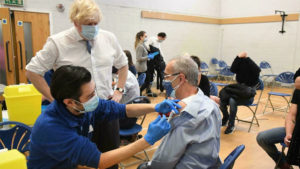 Britain on Monday launched an ambitious Covid booster shot programme to combat what Prime Minister Boris Johnson says is a looming “tidal wave” of Omicron infections.
Britain on Monday launched an ambitious Covid booster shot programme to combat what Prime Minister Boris Johnson says is a looming “tidal wave” of Omicron infections.
London sounded the alarm on Sunday by raising the national Covid Alert Level because of high levels and rising rates of transmission of the virus mutation.
Johnson then gave a rare televised address, warning of a gathering storm that required urgent action to prevent hospitals becoming overwhelmed in the weeks ahead.
“We are clearly once again in a race between the virus and the vaccine”, Health Secretary Sajid Javid told BBC radio on Monday, promising to “throw everything” at the scheme.
All adults will now be able to receive a third dose of a Covid vaccine by the end of December after the government brought forward its deadline by one month.
But in a sign of huge demand, the National Health Service (NHS) vaccination booking site crashed and users requesting rapid testing kits were told they were out of stock.
The “turbocharged” booster programme has seen military planners asked to set up and run extra vaccination centres around the clock.
Some 500,000 booster jabs were given on Saturday but to hit the new deadline that number will have to be doubled every day for the rest of the year to slow the spread.
Javid said there had been a “phenomenal growth” in Omicron infections since it was first detected in Britain at the end of November.
But concerns have mounted about a new wave because of indications that two jabs are less effective against infection than three.
There were 1,239 confirmed cases of the variant recorded on Sunday and scientists have said numbers are doubling every two to three days.
Vaccination rates are high in Britain, with more than 81 percent or 46.7 million of those aged 12 and over having had a second jab.
Some 23 million or 40 percent have so far had a booster.
Limited capacity
The new measures come after face masks were made compulsory in indoor public spaces last Friday, and new testing and self-isolation rules for contact cases began on Monday.
Vaccine passports for certain crowded settings, including at football grounds, are due to be enforced from Wednesday.
The rules apply to England only. The devolved governments in Scotland, Wales and Northern Ireland, which are responsible for health policy, have similar measures.
But they also announced accelerated booster programmes.
The race to vaccinate the nation will come at the cost of already delayed elective surgeries, like hip or knee operations, the government admitted.
“These decisions are not easy, but at any one time there is only limited capacity in the NHS,” said Javid, who added there were currently 10 people in hospital with Omicron.
Johnson’s intervention on Sunday evening sought to refocus attention on the pandemic, after a torrid week in which he and staff were accused of breaking Covid rules last year.
Claims of illegal Christmas parties at Downing Street and across government departments have been seen as undermining public health messaging.
Johnson is also facing a large rebellion from within his Conservative party at a vote in parliament to make the new rules law on Tuesday.
Many Tory MPs are unhappy that freedoms are being restricted again — and even cut further. The vote, though, is likely to pass with opposition Labour support.
As part of the plans, people in England were told to work from home if they can from Monday, bringing it into line with the rest of Britain.
Railway stations and the London Underground were noticeably emptier during the Monday morning rush hour, as workers stayed away from the office.
